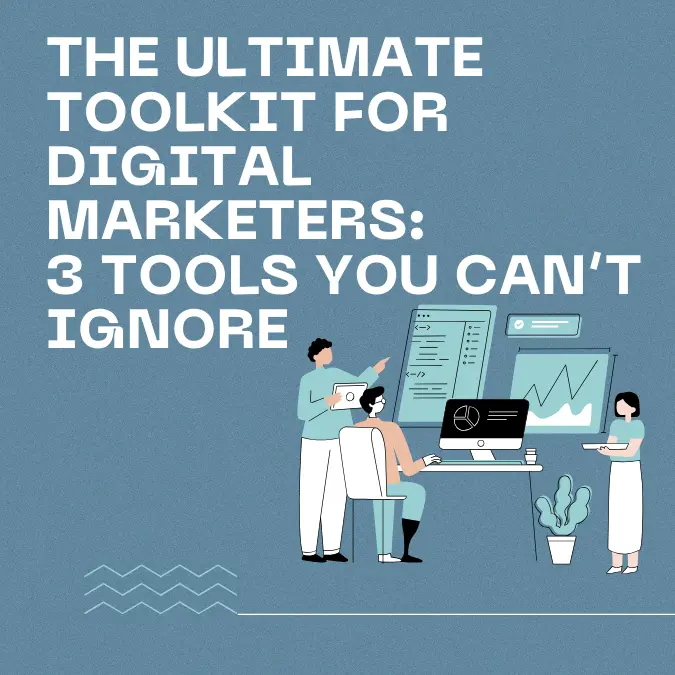Meta Title:
The Ultimate Toolkit for Digital Marketers: 3 Must-Have Tools
Meta Description:
Discover 3 essential tools digital marketers need to boost their marketing efforts. Learn how these Tools Digital Marketers use can elevate your strategy today.
Introduction
In the fast-paced world of digital marketing, having the right tools is the difference between swimming and sinking. But with so many options out there, how do you choose the ones that will truly make a difference? Just like a carpenter needs the right set of tools to craft something extraordinary, a digital marketer needs reliable tools to streamline their efforts and maximize results.
In this article, we’ll explore 3 must-have tools for digital marketers that can help you stay ahead of the game. These tools are designed to simplify tasks, enhance performance, and provide valuable insights that fuel success. Let’s dive in and see how these tools can change the way you market.
Table of Contents
| Sr# | Headings |
|---|---|
| 1 | Introduction |
| 2 | Tool 1: Google Analytics |
| 3 | Why Google Analytics is Essential for Marketers |
| 4 | Tool 2: SEMrush |
| 5 | How SEMrush Improves Your SEO Game |
| 6 | Tool 3: Canva |
| 7 | Why Canva is a Must for Visual Marketing |
| 8 | Comparison: Which Tool to Use for What? |
| 9 | Conclusion |
| 10 | FAQs |
Tool 1: Google Analytics
Why Google Analytics is Essential for Marketers
If you’re serious about digital marketing, Google Analytics is a tool you simply can’t ignore. It’s like having a map that guides you through the digital maze of your website’s performance. Without it, you’re driving blind.
Google Analytics helps you track where your traffic is coming from, which pages are performing well, and where you’re losing potential customers. Imagine trying to build a house without measuring the foundation — that’s what digital marketing is like without analytics. With real-time data and customizable reports, this tool is the foundation of data-driven decision-making for any digital marketer.
Key Features of Google Analytics:
- Real-time traffic monitoring: Know exactly what’s happening on your site at any moment.
- Audience segmentation: Tailor your marketing strategies based on who your visitors are.
- Customizable reports: Focus on the data that matters most to you.
- Conversion tracking: See how well your marketing efforts are paying off.
Tool 2: SEMrush
How SEMrush Improves Your SEO Game
SEO is the backbone of digital marketing, and no tool does it better than SEMrush. Imagine having a Swiss Army knife for SEO—it does everything from keyword research to competitor analysis to backlink audits.
With SEMrush, you can easily see what keywords your competitors are ranking for and how you can outperform them. Whether you’re trying to optimize your website, analyze backlinks, or track rankings, SEMrush offers a complete solution for boosting your online presence.
Key Features of SEMrush:
- Keyword research: Discover high-traffic keywords that drive results.
- Competitor analysis: Spy on your competition’s SEO strategies.
- Backlink auditing: Ensure your site has quality backlinks that improve rankings.
- SEO site audit: Identify and fix on-page issues that hurt your SEO.
Tool 3: Canva
Why Canva is a Must for Visual Marketing
Not every marketer has the luxury of a full design team. That’s where Canva steps in. Canva is like the ultimate graphic design assistant, making it incredibly easy for anyone to create stunning visuals, whether for social media, blog posts, or paid ads.
With its drag-and-drop interface and pre-designed templates, even those with no design background can create professional graphics in minutes. Visual content is vital for any marketing campaign, and Canva ensures you never have to sacrifice quality for convenience.
Key Features of Canva:
- Drag-and-drop design tools: Simplify the creation of eye-catching visuals.
- Pre-made templates: Start from a ready-made design and customize it to fit your brand.
- Collaboration features: Work with your team seamlessly in real-time.
- Social media integration: Post directly to your social platforms from Canva.
Comparison: Which Tool to Use for What?
Each of these tools brings something unique to the table, and knowing when to use which one is the key to maximizing your marketing efforts.
- Google Analytics is your go-to for data analysis. Use it to understand your audience and track your marketing efforts.
- SEMrush should be your tool of choice for anything SEO-related. From keyword research to competitor analysis, this tool is a digital marketer’s best friend for improving search rankings.
- Canva is essential when it comes to creating high-quality visuals for your campaigns. Whether it’s for social media posts or website banners, Canva has you covered.
Think of these tools as the core pillars of your digital marketing toolkit — each one plays a vital role, and together, they can take your marketing to the next level.
Conclusion
The digital marketing landscape is evolving rapidly, and staying ahead requires using the right tools. Google Analytics, SEMrush, and Canva are three powerful tools that no digital marketer should be without. These tools simplify complex tasks, provide actionable insights, and make marketing more efficient and effective.
By leveraging the full potential of these tools, you’ll be able to craft smarter marketing strategies, improve your ROI, and stand out in an increasingly competitive market.
FAQs
1. What are the key tools every digital marketer should use?
The three essential tools for digital marketers are Google Analytics for data tracking, SEMrush for SEO optimization, and Canva for visual content creation.
2. Can I use Google Analytics for free?
Yes, Google Analytics offers a free version that provides robust tracking and insights into your website’s performance.
3. How does SEMrush help with SEO?
SEMrush helps by offering keyword research, competitor analysis, backlink audits, and more to boost your site’s SEO rankings.
4. Is Canva suitable for beginners?
Absolutely! Canva is designed to be user-friendly and provides pre-made templates that make it easy for anyone to create professional designs.
5. Which tool should I prioritize if I’m just starting with digital marketing?
Start with Google Analytics to understand your audience and measure your efforts. As you grow, integrate SEMrush for SEO and Canva for visuals.



